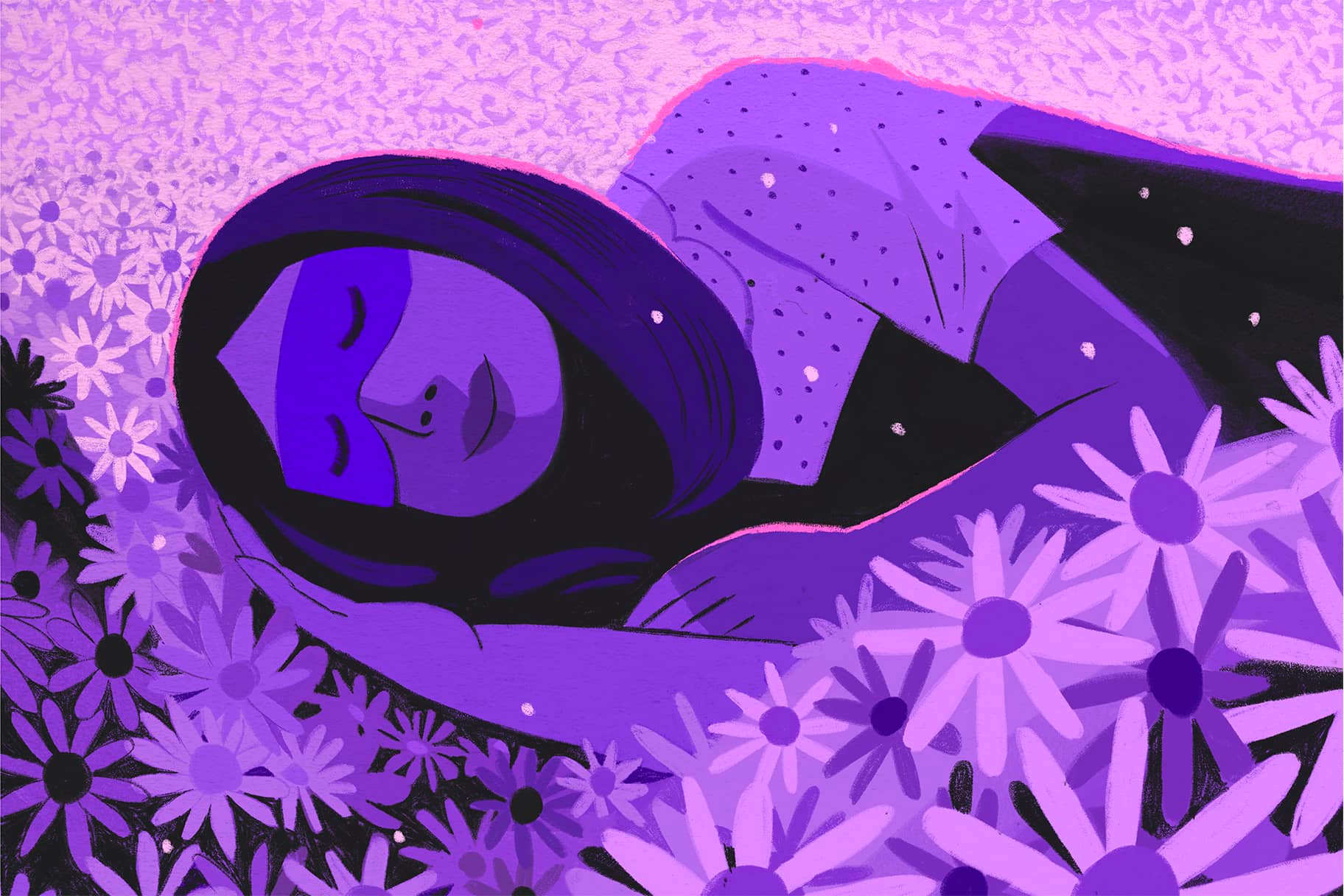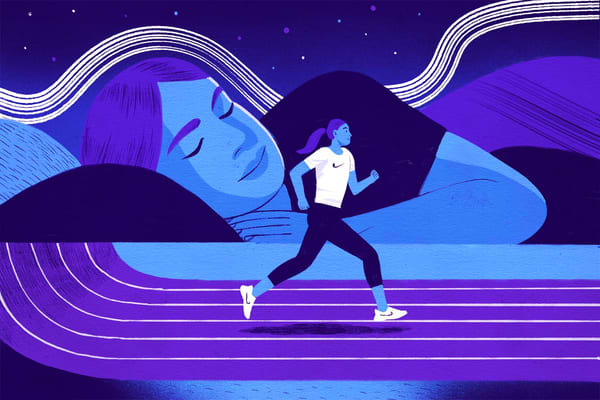How to Sleep Better at Night, According to Experts
Health & Wellness
A registered dietitian and sleep psychologist offer advice on how to get more restful sleep each night.

It's well-documented that good sleep is a fundamental part of holistic well-being. But, between squeezing in one more episode before lights out or a little friendly revenge bedtime procrastination, many people struggle with getting a good night's rest.
And while there are over-the-counter supplements that can help with this, you may be wondering if there are other natural remedies that might suffice instead. According to experts, eating certain foods, exercising and maintaining a consistent routine, in particular, will help teach your body how to sleep better at night naturally. Learn more about these and other expert-backed, sleep-friendly practices below.
1.Eat Sleep-Promoting Foods

The food you eat impacts your sleep, which is why Amy Shapiro, MS, RD, CDN, recommended consuming more foods that can help to unwind and relax, especially near bedtime.
Walnuts: nuts such as almonds and walnuts, in particular, she said, are great for sleep. Here's why: "walnuts are one of the best food sources of melatonin, [the] sleep hormone", she said. Shapiro explained that this particular type of nut also contains a good source of alpha-linolenic acid, or ALA, which is a common omega-3 fatty acid. The body then converts the ALA from the nut into two key omega-3 fatty acids called docosahexaenoic acid (DHA) and eicosapentaenoic acid (EPA).
"DHA may increase serotonin production, helping to lull [you] into sleep", she said. For the best results, she advised eating around eight to 10 (or a handful) of walnuts 30 minutes to an hour before going to sleep. This equates to one serving of walnuts and any less, she said, may not produce the same effect.
Almonds: almonds are also rich in melatonin, as well as an important trace mineral, magnesium.
"[It's] a nutrient that relaxes our muscles and nervous system, reduces inflammation and therefore improves sleep quality", Shapiro said. Just 28 grams of almonds (about 23 almonds) satisfies 19 percent of your daily needs of magnesium, she added. As a result, eating them roughly 30 minutes to one hour before bed may help induce restful sleep.
Kiwi: if you have a nut allergy, or simply don't like almonds or walnuts, Shapiro recommended adding kiwi to your evening snack rotation.
"Kiwis contain 71 percent of the daily value for vitamin C and are rich in carotenoids", she said. "Both are powerful antioxidants and antioxidants reduce inflammation, therefore promoting quality sleep".
She noted a four-week 2011 study, which demonstrated that consuming two kiwis one hour before bed every night helped participants fall asleep 42 percent more quickly compared to when they didn't eat anything before bedtime.
2.Exercise Four to Six Hours Before Bedtime

Exercise during the day can support improved sleep patterns at night, but the goal isn't to target specific exercises for better sleep, according to Shelby Harris, Psy D, a sleep specialist and author of "The Women's Guide to Overcoming Insomnia". What matters most is when you exercise.
Harris said the ideal time to exercise is four to six hours before your natural bedtime. "This allows for your body to warm up slightly and then cool off naturally before bedtime, which helps to signal to your brain that sleep is coming and to release melatonin that's naturally made in your brain [helping] you fall asleep".
Conversely, Harris said, if you exercise vigorously within three hours of bedtime, "that can often make it harder for some people to fall asleep because it doesn't allow for enough of that cooling-off period and can make your body internally too warm". When your internal body temperature is too warm, that can delay sleep.
Ideally, aim to exercise earlier in the day. If exercising later in the day is your only opportunity, then Harris recommended doing something gentle such as yoga, stretching or a leisurely walk.
3.Keep a Consistent Wake and Sleep Routine

One of the best things you can do to naturally train your body to sleep better at night is by going to bed and waking up around the same time every day, Harris said. And yes—this includes weekends. "Consistency helps our body's circadian time clock know when to naturally fall asleep and wake up", she said.
Your wind-down routine before bed also matters. Harris recommended spending at least 30 minutes (but ideally an hour) before bedtime away from screens, such as your phone and TV. Instead, she suggested writing, meditating, reading, drawing or doing gentle nighttime yoga—all of which help quiet the brain and body.
Keeping your morning routine consistent also helps you get better sleep. Specifically, Harris recommended exposing yourself to natural light in the morning after waking up. "This is a great time to help set your natural body clock", she said. Light, she explained, alerts your mind and body and stops melatonin production in the morning, both of which help maintain a consistent sleep schedule.
4.Avoid Consuming Caffeine and Alcohol

Harris also advised limiting alcohol consumption within three hours of sleep time. "This can worsen sleep quality and lead to more nighttime awakenings", she explained. "It leads to less REM sleep, as well, and can make you have more difficulty with thinking and emotion regulation the next day, which is what REM helps with".
Shapiro explained that although alcohol provides a relaxing effect when drinking it, it can also cause a drop in blood glucose (sugar) levels, which is what leads to interrupted sleep. And, when your body is working on removing the alcohol from your system, that can reawaken you during the night as well.
The same goes for caffeine. Harris said that consuming it later in the day may make it more difficult to fall asleep, and even lead to more shallow sleep instead of the restorative sleep your body needs for optimal well-being.
Shapiro seconds this advice. "Caffeine for some individuals is a stimulant that will deter them from falling asleep", she said. "If you are sensitive, then I recommend not drinking it past 12 to 2pm. [Some] people have a cup at 4pm, which can be too late. Your body needs enough time to metabolise it and remove it from the body".
Ideally, limit caffeine intake within eight hours of bedtime. If you want to have a cup of coffee or espresso in the afternoon, consider making it decaf to ensure better sleep quality at night.
5.Drink Chamomile Tea

Shapiro recommended brewing a cup of chamomile tea before bed to help you relax, as the beverage has been shown to have a sedative effect on the body.
"Chamomile is a source of flavonoids, which are antioxidants that have been shown to reduce inflammation in the body and therefore promote sleep", she said. "It also contains apigenin, an antioxidant that binds to certain receptors in the brain that may increase sleepiness, [preventing] insomnia".
Words by Jessica Estrada





